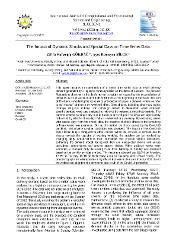| dc.contributor.author | Gökdağ, Zehra Hafızoğlu | |
| dc.contributor.author | Bilge, Ayşe Hümeyra | |
| dc.date.accessioned | 2023-10-19T14:55:52Z | |
| dc.date.available | 2023-10-19T14:55:52Z | |
| dc.date.issued | 2023 | |
| dc.identifier.issn | 2149-9144 | |
| dc.identifier.uri | https://doi.org/10.22399/ijcesen.1311166 | |
| dc.identifier.uri | https://search.trdizin.gov.tr/yayin/detay/1182938 | |
| dc.identifier.uri | https://hdl.handle.net/20.500.12469/4589 | |
| dc.description.abstract | This paper includes an examination of a 4-year time series data on retail delivery demand generated by a logistics company based on the dates of creation. The periodic fluctuations observed in the data's normal structure are caused by the accumulation of demands over the weekend and their fulfillment at the beginning of the week. The aim of the study is modelling the response to unexpected changes in demand, which we refer to as "shocks," similar to the weekend effect. Special days, including single-day public holidays, religious holidays, and campaign periods in November, which represent specific periods, were also analyzed to interpret the patterns during these periods. The patterns created by single-day public holidays and religious holidays are significantly influenced by whether these days fall on a weekend or a weekday. By excluding weeks with special days from the overall data, the presence of shock effects in the remaining ordinary weeks was examined. During this period, the shock caused by the Covid-19 pandemic and adverse weather conditions was observed. The impact of the Covid-19 shock lasted longer compared to other shocks. When the increase in demand due to shocks exceeds the capacity of existing vehicles, the problem can be resolved by arranging daily rental vehicles from companies that provide vehicle allocations. Extracting the demand model for special days and unexpected shocks will ensure operational preparedness and prevent process delays. When ordinary weeks were examined, a monotonically decreasing trend from Monday to Sunday was observed based on the weekly average demand. The maximum demand was 58.3% on Monday, 17.2% on Tuesday, 15.9% on Wednesday, 7.3% on Thursday and 1.3% on Friday. The provided graphs also demonstrate a significant increase in demands in early 2020 due to the widespread adoption of e-commerce as a result of the Covid-19 pandemic | en_US |
| dc.language.iso | eng | en_US |
| dc.relation.ispartof | International Journal of Computational and Experimental Science and Engineering | en_US |
| dc.rights | info:eu-repo/semantics/openAccess | en_US |
| dc.title | The Impact of Dynamic Shocks and Special Days on Time Series Data | en_US |
| dc.type | article | en_US |
| dc.identifier.startpage | 183 | en_US |
| dc.identifier.endpage | 190 | en_US |
| dc.identifier.issue | 2 | en_US |
| dc.identifier.volume | 9 | en_US |
| dc.identifier.doi | 10.22399/ijcesen.1311166 | |
| dc.institutionauthor | N/A | |
| dc.relation.publicationcategory | Makale - Ulusal Hakemli Dergi - Kurum Öğretim Elemanı | en_US |
| dc.identifier.trdizinid | 1182938 | en_US] |
















